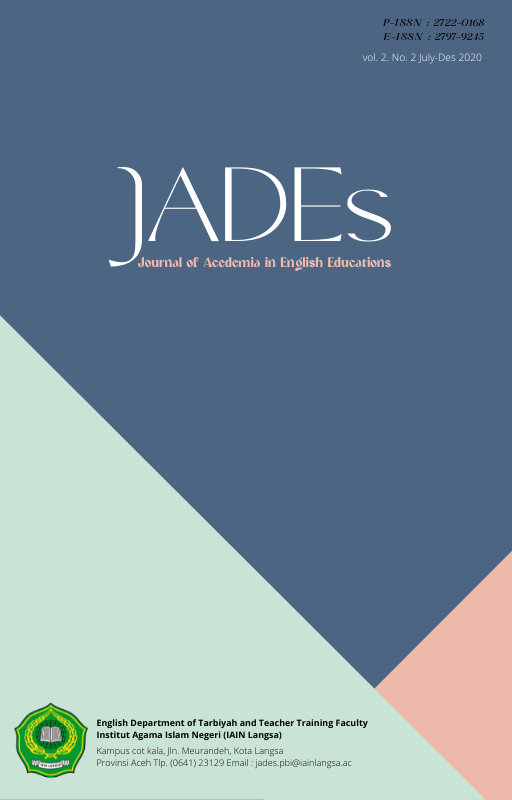Main Article Content
Abstract
This study aims to investigate the utilization of TikTok to enhance the speaking ability and motivation of pre-service teachers at Muhammadiyah University of Kalimantan Timur. The primary focus is on exploring how incorporating TikTok into teaching practices can positively impact the development of speaking skills and motivation among pre-service teachers. The research methodology involves a mixed-method approach, combining surveys, interviews, and classroom observations. Initial findings suggest that integrating TikTok in teaching activities has the potential to engage students, boost motivation, and improve their speaking proficiency. These results have significant implications for the integration of technology in language education and can inform future strategies aimed at enhancing teaching and learning outcomes.
Keywords
Article Details

This work is licensed under a Creative Commons Attribution 4.0 International License.
References
- Afiah, N. A., Atmowardoyo, H., & Sakkir, G. (2022). (2022). The use of social media in learning english vovabulary. PERFORMANCE: Journal of English Education and Literature, 1(1).
- AHmad, J. (2016). Technology Assisted Language Learning is a silver bullet for enhancing Language competence and performance: A Case Study. International Journal of Applied Linguistics and English Literature, 5(7). https://doi.org/10.7575/aiac.ijalel.v.5n.7p.118
- Dos Santos, L. M. (2019). Pre-service teachers’ professional development through four-step problem-solving model: A seminar method. International Journal of Education and Practice, 7(3), 146–157. https://doi.org/10.18488/journal.61.2019.73.146.157
- Fetters, J. W. C. M. D. (2002). Designing A Mixed Methods Study In Primary Care. Bmj, 325(7354), 22. https://doi.org/10.1136/bmj.325.7354.22
- Ghazvini, S. D., & Khajehpour, M. (2011). Attitudes and motivation in learning English as second language in high school students. Procedia - Social and Behavioral Sciences, 15, 1209–1213. https://doi.org/10.1016/j.sbspro.2011.03.264
- Ghufron, M. A., Taufiq, A., & Riskiyanto, M. (2022). Pre-Service English Teachers’ Pedagogical Competence in Teaching English: A Case of Teaching Internship Program (TIP). English Learning Innovation, 3(1), 27–41. https://doi.org/10.22219/englie.v3i1.19382
- Herlisya, D., Alfiawati, R., & Dodo, I. (2020). The Influence of Instagram ’ S Pictures Towards the Students ’. Journal of English Teaching and Applied Linguistic, 1, No 2.
- I Ketut Armawan, & Gede Mahendrayana. (2023). Motivation and Factors Affecting Pre-Service English Teacher in Joining Webinar Session. Journal for Lesson and Learning Studies, 6(3), 487–496. https://doi.org/10.23887/jlls.v6i3.69798
- Iqbal, M. (2021). TikTok revenue and usage statistics (2021). Business of Apps, 1(1).
- Kessler, G. (2016). Technology in language teaching and learning.
- Masbirran, G., & Fauzi, A. (2018). Speaking Skill in Using Community Language Learning (Cll). Indonesian Journal of Integrated English Language Teaching, 3(2), 198–205. https://doi.org/10.24014/ijielt.v3i2.4844
- Nasution, A. K. P. (2022). Social Media Used In Language Learning: Benefits And Challenges Awal Kurnia Putra Nasution. Journal of Linguistics, Literature and Language Teaching, 1(2), 59–68.
- Nur Aisyiah, V. M., & Erizar, E. (2023). Utilizing Tiktok Application in Learning English for EFL University Students in Indonesia. ENGLISH FRANCA : Academic Journal of English Language and Education, 7(2), 383. https://doi.org/10.29240/ef.v7i2.7868
- Nurmy, A. R. (2017). Facebook as A medium in English learning as foreign language at Iain Pontianak. At-Turats, 11(1), 48–57.
- Patty, J., Noija, L. F. A., Inggris, K. B., & Bahasa, P. (2023). Social Media Revolution: Tiktok ’ S Impact on Language. Jurnal Review Pendidikan Dan Pengajaran (RPP), 6, 937–945.
- Pranata, H., Al Farisi, K. W., Iddiyaturrohmah, M., Wardana, A., & Jaelani, S. R. (2023). Speaking with Native Speakers to Improve Speaking Skills. Jurnal Faidatuna, 4(3), 88–97.
- Pratiwi, A. E., Ufairah, N. N., & Sopiah, R. S. (2021). Utilizing TikTok application as media for learning English pronunciation. In International Conference on Education of Suryakancana (IConnects Proceedings).
- Reardon, D. (2018). Communication, language and literacy in the early years. 117.
- Sah, P. K. (2015). “Let’s Tweet to Learn Englishâ€: Using Twitter as a Language Tool in the ESL/EFL Classroom. LangLit, 2(1), 10–17.
- Yugafiati, N. A. P. N. S. R. R. (2021). Students’ Motivation in Learning English. Linguistic, English Education and Art (LEEA) Journal, 4(2), 401–413. https://doi.org/10.31539/leea.v4i2.2256
- Zaitun, Hadi, M. S., & Indriani, E. D. (2021). TikTok as a Media to Enhancing the Speaking Skills of EFL Student ’ s. Jurnal Studi Guru Dan Pembelajaran, 4(1), 4(1), 89-94.
- Zulli, D., & Zulli, D. J. (2022). Extending the Internet meme: Conceptualizing technological mimesis and imitation publics on the TikTok platform. New Media and Society, 24(8), 1872–1890. https://doi.org/10.1177/1461444820983603
